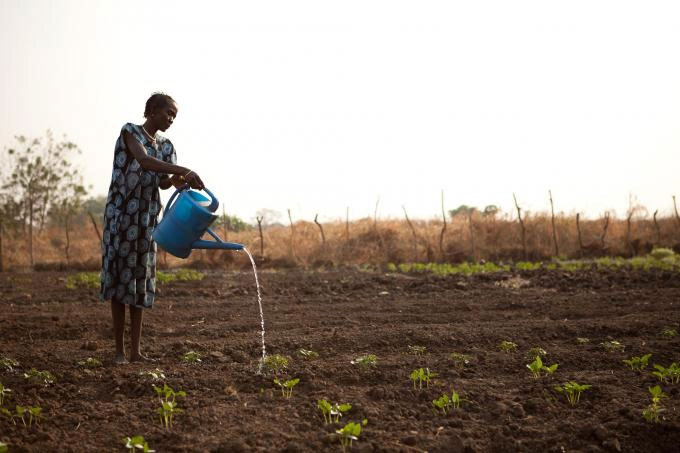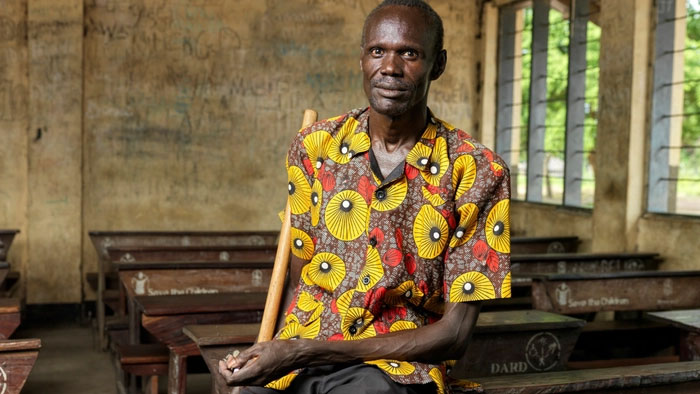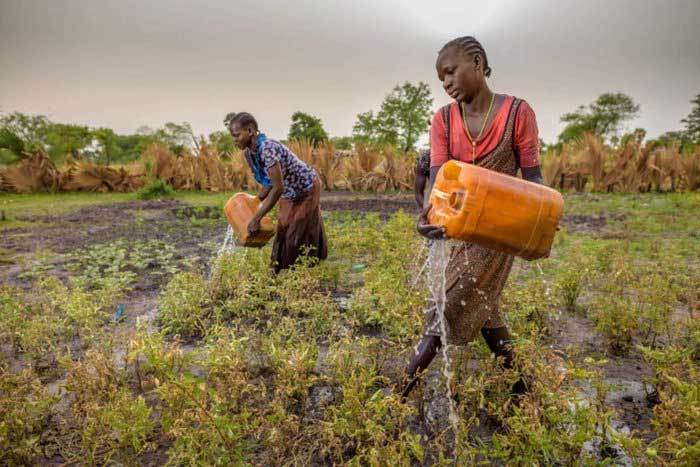South Sudan has experienced several months without rain. This is severely impacting the lives of its people, especially girls.
“There are times when I feel so hungry that I think going to school is a waste of time. I have had to miss school for several days“, shared Martha, a 15-year-old student, as she packed her math textbooks into her bag when the school bell rang for recess.
Previously, Martha’s school in Rumbek, Lakes State welcomed thousands of students. The concrete classrooms were always filled with students in bright uniforms. However, recently, fewer and fewer students are attending school, especially girls. They are forced to stay home as famine ravages the country.
Some female students are encouraged to go out and work to help their parents. Others are forced to eat less than the men and boys in their families because they contribute more labor.
South Sudan, the youngest country in the world, is facing a severe hunger crisis. Approximately 7.7 million people, or 63% of the population, are facing severe food insecurity. This crisis is caused by multiple factors including the impact of the Covid-19 pandemic, climate change (drought, aridity), and more.

South Sudan has experienced severe drought.
“Children are the most affected by this crisis, particularly girls. We are facing the risk of severe food insecurity“, said a member of Plan International.
Girls Who Have Never Had Enough to Eat
According to this organization, when food is scarce, girls often eat less or are the last to eat. Women and girls make up 70% of the world’s poor population. In struggling families, girls tend to miss school more than boys and are also forced into early marriages.
Martha is the eldest in a family of seven children. She dreams of becoming a doctor, but that dream is increasingly distant. She shared, “My father sometimes asks me to stay home and help the family find food. He also asks my younger sister to stay home instead of going to school“.
Even on days when Martha does attend school, she feels left behind compared to her peers, unable to grasp the new lessons: “I have tried to catch up with everyone, but it’s very difficult because my friends explain things differently from how the teacher teaches“.
Clement Makuak has been a teacher for over 16 years. He teaches math, science, and English. Each day at the start of class, he notices fewer students attending.

Clement Makuak witnesses dwindling student attendance.
At noon, hundreds of students stand in long lines to receive lunch at school. The meal consists only of beans and rice, but many students are eager because they will fill their empty stomachs.
Martha’s school is one of 38 schools in Lakes State that provide lunch. It offers free meals to 21,000 students each day. Previously, there were 71 schools supported, but this program has been scaled back due to financial difficulties.
The cutbacks mean that many students now only get one meal a day at home. Previously, when the school provided lunch, they had two meals a day.
Hellena, a student at Martha’s school, shared, “We only get to eat once a day in the evening; there is nothing for breakfast or lunch in our family“.
The issue of food scarcity in the local community is not uncommon. Like many of her peers, Hellena does not have enough nutrition to grow and develop due to the lack of rain for many months.
“The crops my parents usually plant are peanuts, sorghum, and maize, but they cannot be harvested because there has been no rain. Now, my family only eats pumpkin leaves. This is a vegetable that only has leaves and does not produce fruit“, Hellena explained.
Her family struggles to make ends meet for school fees and food with their meager income. Hellena’s father sells small bags of sugar by the roadside, while her mother used to sell peanuts but has stopped due to the rising costs of goods.
An Uncertain Future
Hellena said that the gnawing hunger makes it hard for her to concentrate on her studies: “Life is becoming more difficult for me and my classmates. I cannot focus to understand the lessons in the afternoon. I can only be attentive during the morning classes“.
Like Martha, many other girls also frequently miss school. Hellena explained that she has to stay home for many days because there is no one to take care of her siblings while her parents go out to find food.
“Sometimes the class will be missing a few students for many days. This happens far too often“, the student added.
When teacher Clement visited the home of one of the female students who had dropped out, he found that the girl was tasked with doing housework and caring for her siblings while the adults were out searching for food.

The future of these children is uncertain as hunger persists.
Grace, 14, dreams of becoming a computer scientist one day, but she has also been struggling to focus on her studies: “I only eat once a day. Today, I had pumpkin leaves, but it’s still not enough. I feel I need to eat more. After that, when I start doing my homework and other tasks like fetching water from afar, I feel weak and exhausted“.
Although Grace’s family lives close to the school, the water source is always very far, and she needs to walk for 30 minutes to reach a point with water.
“I have had to skip school a few times because there was not even a single vegetable left to eat at home. I have to look after my siblings while my parents are away. Even when I do get to school, I feel too weak to write or understand what the teacher is teaching“, Grace shared about her difficult life.
As a girl, Grace often finds herself eating less than her brothers: “My mother often tells me to give my food to my brothers. I find it unfair. We all need to eat equally“.
Nyanagok from Plan International stated: “We have encountered many situations where girls eat less than boys. In our culture, there is always a preference for boys.
We always tell people that boys and girls are equal, especially children, as they are growing and need to share food equally“.
According to Nyanagok, the hunger crisis is putting girls at a disadvantage. For many students at Martha’s school and across South Sudan, having a full meal has become a luxury.
“January was the last month I had two meals. During this dry season, I feel hungrier. I sometimes also have stomachaches and headaches. It feels terrible“, Martha acknowledged the heartbreaking reality, stating that her family now only eats once a day, mainly maize flour and salt.



















































